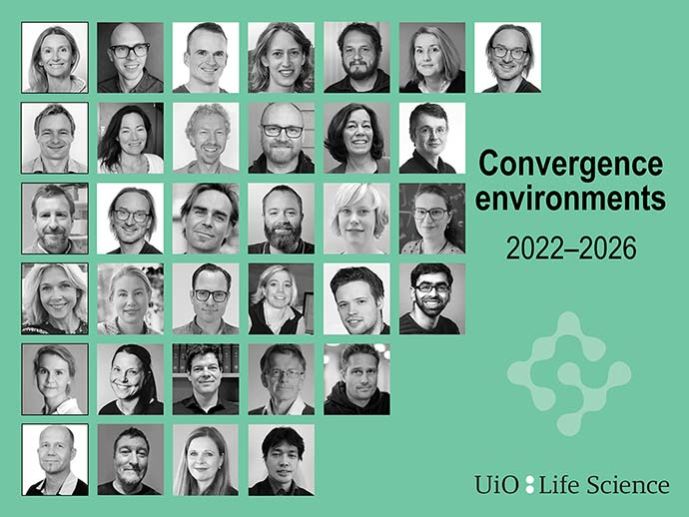In total, we have 20 convergence environments. Six groups were established after the first application round in 2016/2017, convergence environment I. Eight new groups were established after the second application round in 2018/2019, convergence environment II. After the third application round in 2020/2021 six groups have been established, convergence environment III.
Convergence environments III – 2022–2026
These six convergence environments were selected after the application process in 2020/2021 and are starting up in 2022.

- AUTORHYTHM – the role of autophagy in healthy aging will study the recycling system of our cells in time and space to improve people's health and life span.
Read more -
Societal and environmental determinants of brain and cognition (AHeadForLife) will uncover how social factors and genes affect the brain and cognitive function throughout life.
Read more - Integrated technologies for tracking organoid morphogenesis (ITOM) will use advanced imaging technology and data analysis to improve stem cell derived organ representations.
Read more - Real world – artificial worlds: Improving causal inference in perinatal pharmaco-epidemiology using machine learning approaches on real-world and artificial data (UIO:RealArt) will use machine learning on health data and simulated data to understand the causal relationship between medication use in pregnancy and child development.
Read more -
Novel personalized management strategies for fibrosing diseases (FibroPET) aims to improve the course of the disease and treatment outcome of patients with fibrosing diseases.
Read more -
Modeling Human Multi-Organ Interaction in Disease - Cancer Cachexia (MORGI) will create a platform with organ representation technology to explain communication between organs in case of disease.
Read more
Convergence environments II – 2019–2023
These convergence environments started in 2019. They were selected in an application process in 2018/2019.

- Artificial Biomimetic systems- the Niche of Islet Organoids (ABINO) wants to develop future models for diabetes research by using new strategies for stem cell differentiation.
Read more. - Availability and function of donor organs: Debating the dead donor rule (3DR) wants to increase availability and function of donor organs for transplantation and to create societal awareness and debate on ethical issues using Donation after Circulatory Death (DCD).
Read more. - Consciousness and brain states: neuroscience studies and conceptual innovation (ConsciousBrainConcepts) wants to further develop the consciousness concept to solve fundamental issues in consciousness research.
Read more. - Linguistics-driven machine learning to decipher the molecular language of immunity (ImmunoLingo) wants to decipher how disease and antigen recognition is encoded in the immune system and to perform experiments in silico to improve intervention and treatment of human diseases.
Read more. - Medical, legal and lay understandings of physical evidence in rape cases (Evidently Rape) wants to study how physical evidence matters and can matter in how the crime of rape is met by medical and criminal justice institutions.
Read more. - MultiModal Mental Models: converging approaches from genomes to mental illness and interplay with psychosocial stressors (4MENT) wants to better understand the etiology and disease mechanisms of severe mental disorders, focusing on schizophrenia, bipolar disorder and related mental phenotypes.
Read more. - Protons contra cancer (PROCCA) wants to create an excellent platform for collaborative efforts in proton therapy in Oslo and among other issues study how biological short term and long term side effects of radiation therapy can be reduced.
Read more. - Rediscovery of medicinal plant usage in the “Age of Exploration”: From cultural historical heritage to innovative pharmaceuticals (REA:Life) wants to unveil the processes that have shaped the social and cultural development of medicine and identify bioactive compounds in historical medicinal plants with cutting edge methods.
Read more.
Convergence environments I – 2017–2021
These convergence environments were established in 2017. They were selected in an application process in 2016/2017. Their funding time is completed.

- Combining natural and social sciences to understand and manage global anthropogenic toxicants (AnthroTOX) wants to understand how environmental and social processes and their relationships dictate flows and impacts of anthropogenic toxicants from electronic waste. This will be studied within and across societies and ecosystems. Results from Tanzania will be compared to data from the Arctic.
Read more.
Watch video with AnthroTox - Comparative immunology of fish and humans (COMPARE) wants to find out how the peculiar immune system of the codfishes function in detail and what its implications are for human immune disease. The results will affect future aquaculture, human medicine as well as providing a social sciences case for our awareness of the future possibilities of gene modifications of fish and humans.
Read more. - Epigenetics and bioethics of human embryonic development wants to understand the epigenetic reprogramming of early embryo development and its significance for human reproduction both scientifically and ethically. An overarching theme will be the understanding of epigenetic information in the passing of life from one generation of humans to the next.
Read more. - Organ on a chip and nano-devices (CHIP) wants to develop an “Organ on a chip” interface. This will provide a powerful new platform for understanding and testing of physiological functions and therapeutic interventions.
Read more. - Personalised cancer therapies (PERCATHE) wants to develop a new approach to personalised cancer therapy, based on mathematical, statistical and biological methods. It will also study the ethical, societal and regulatory perspectives.
Read more
Watch video with PERCATHE - Programmable Cell-like Compartments wants to develop cell-like compartments which can in the future be assembled and programmed to track and deactivate hazards such as pathogenic microorganisms, migrating cancerous cells, plastics micro-particles, or heavy metal sediments.
Read more.